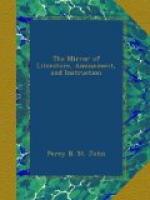one leg, and covered with a napkin. The prefect
of the palace stood close by this table, with his
hat under his arm. The breakfast rarely lasted
beyond eight minutes. Sometimes, however, men
of science or literature, or distinguished artists,
were admitted at this time, with whom Napoleon is
represented to have conversed in an easy and lively
style. Amongst these were M. Monge, Costaz, Denon,
Bertholet, Corvisart, David, Gerard, Isabey, Talma,
and Fontaine. Dinner was served at six o’clock;
the emperor and the empress dined alone on the common
days of the week, but on Sunday all the imperial family
attended, upon which occasion Napoleon, the empress,
and Madame Mere had arm-chairs, and the rest chairs
without arms. There was only one course.
The emperor drank no wine but Chambertin, and that
usually mixed with water. Dinner lasted in general
from fifteen to twenty minutes. All this time
the prefect of the palace had to superintend the affair
en grand, and to answer any questions put to
him. In the drawing-room a page presented to
the emperor a waiter with a cup and a sugar-stand.
Le chef d’office poured out the coffee; the
empress took the cup from the emperor; the page and
the chef d’office retired; the prefect waited
till the empress had poured the coffee into the saucer
and given it to Napoleon. After this the emperor
went to his papers again, and the empress played at
cards. Sometimes he would come and talk a little
while with the people of the household in the apartments
of the empress, but not often, and he never staid
long. Upon his retiring, the officers on duty
attended the audience
du coucher, and received
their orders for the morrow. This was the ordinary
economy of the emperor’s time, when not with
the army.
Napoleon read the English newspapers every day in
French, and M. de Bausset says the translation was
rigorously exact. One day in January, 1811, the
emperor gave some of these extracts to de B., and ordered
him to read them aloud during dinner. The prefect
got on pretty well, till he stumbled at some uncouth
epithets, with which he was puzzled how to deal, especially
in the presence of the empress, and a room full of
domestics. He blew his nose, and skipped the
words—“No!” said Napoleon, “read
out! you will find many more.” “I
should be wanting—” “Read, I
tell you,” repeated the emperor, “read
every thing!” At last de B. ran upon “tyrant
or despot,” which he commuted for “emperor.”
Napoleon caught the paper out of his hands, read the
real phrase aloud, and then ordered M. de B. to continue.
These translations used to be made by Maret, Duke of
Bassano.
* * * *
*
THE GATHERER.
“A snapper-up of unconsidered
trifles.”
SHAKSPEARE.
* * * *
*
RETENTIVE MEMORY.
The historian, Fuller, in 1607, had a most retentive
memory; he could repeat 500 strange, unconnected words,
after twice hearing them; and a sermon verbatim, after
reading it once. He undertook, after passing from
Temple Bar to the farthest part of Cheapside and back
again, to mention all the signs over the shops on
both sides of the streets, repeated them backwards
and forwards, and performed the task with great exactness.




